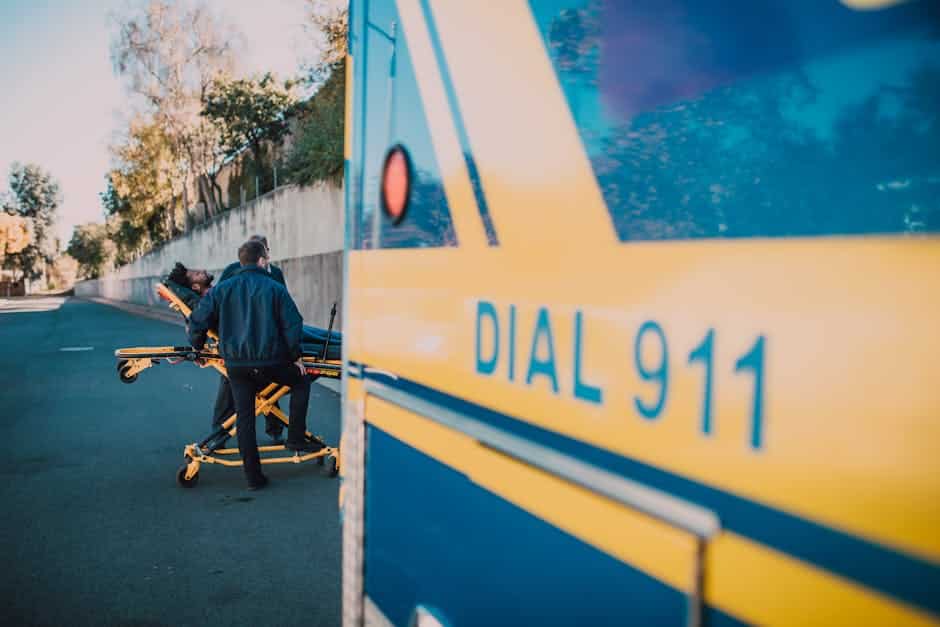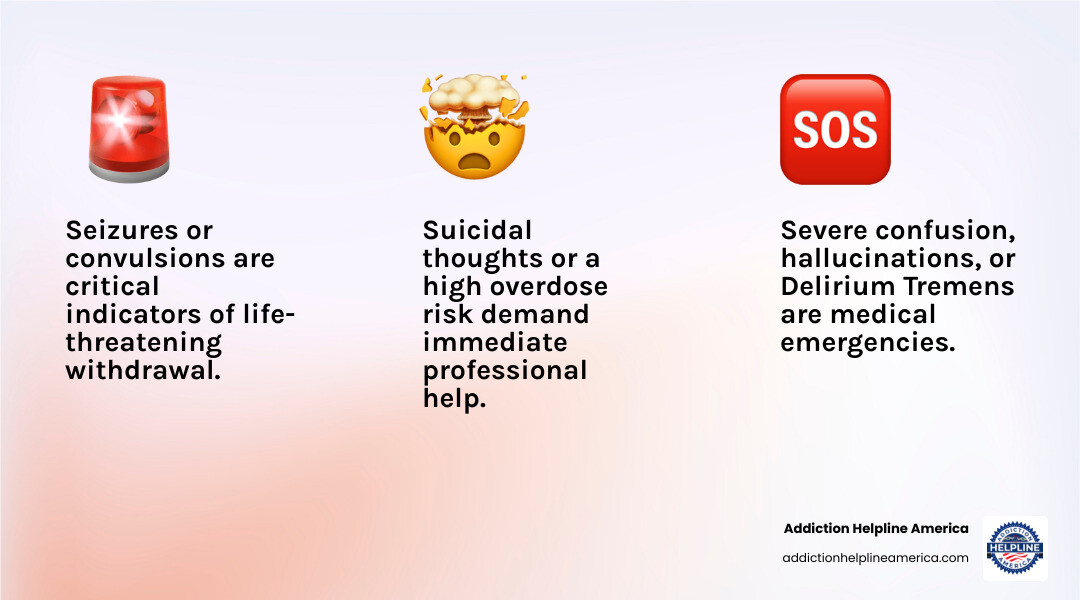
Why Immediate Medical Intervention Can Save Your Life
Emergency detox services provide immediate, medically supervised care for individuals facing dangerous withdrawal or life-threatening intoxication. These programs offer 24/7 monitoring and medication-assisted treatment to stabilize patients and prevent fatal complications.
Key Facts About Emergency Detox:
- Same-day admission is often available for severe or life-threatening cases.
- Medical supervision is crucial for managing withdrawal from alcohol, benzodiazepines, and opioids.
- Duration typically lasts 3-7 days but can be longer depending on the case.
- Cost is frequently covered by insurance, Medicaid, or Medicare.
- Next steps involve transitioning to an ongoing addiction treatment program after stabilization.
Withdrawal from substances like alcohol and benzodiazepines can be deadly, causing seizures and other life-threatening complications. Opioid withdrawal, while not typically fatal itself, leads to a high risk of overdose upon relapse due to decreased tolerance.
If you or someone you know is experiencing severe withdrawal symptoms, call 911 immediately.
The addiction crisis in the United States continues to worsen, with overdose deaths rising dramatically. Many of these tragedies occur because individuals cannot access emergency medical care during a withdrawal crisis. Emergency detox services bridge this critical gap by providing rapid admission and expert medical management to keep you safe during the most dangerous phase of recovery.
While hospital emergency rooms are required by federal laws like EMTALA to provide addiction care, dedicated detox facilities often offer a more suitable environment with specialized staff and longer stays. These centers are designed specifically for withdrawal management.
Detox is not a cure for addiction—it is the critical first step. Lasting recovery requires addressing the underlying causes of addiction through ongoing treatment. At Addiction Helpline America, we connect people to life-saving emergency detox services nationwide. We are here to guide you toward immediate, confidential help.

Quick Emergency detox services definitions:
Understanding the Critical Need for Emergency Detox Services

When your body is dependent on drugs or alcohol, quitting suddenly can send your system into shock, triggering withdrawal symptoms that range from uncomfortable to life-threatening. This is why emergency detox services are not just helpful—they are essential.
Overdose deaths continue to rise, and many of these deaths could have been prevented with immediate, compassionate care. Withdrawal from certain substances is incredibly dangerous. Alcohol withdrawal can cause seizures and delirium tremens, a condition requiring emergency medical attention. Benzodiazepine withdrawal carries similar fatal risks. While opioid withdrawal is rarely fatal on its own, the intense symptoms often lead to relapse. After even a few days of abstinence, tolerance drops, making a return to a previous dose potentially lethal. Waiting for treatment can be a deadly gamble.
What Are Emergency Detox Services?
Think of emergency detox services as an ER for addiction crises. These specialized medical programs provide 24/7 care to manage severe withdrawal or dangerous substance use. The primary goal is to clear harmful substances from your body while keeping you safe. Medical teams monitor vital signs, administer medications to ease withdrawal and prevent complications, and provide a secure environment where help is always available. This is evidence-based medical detoxification that prioritizes your safety to stabilize you for the next phase of recovery.
When to Seek Emergency Detox Services
Do not try to “tough out” a severe withdrawal alone. Seek professional help immediately if you or someone else experiences:
- Severe withdrawal symptoms like uncontrollable shaking or intense vomiting
- Seizures or convulsions
- Hallucinations (seeing or hearing things that aren’t there)
- Delirium tremens (DTs): severe confusion, fever, and agitation during alcohol withdrawal
- Suicidal thoughts or urges to self-harm
- Signs of overdose, such as slowed breathing or unresponsiveness
- Chest pain, irregular heartbeat, or difficulty breathing
These are medical emergencies. For alcohol and benzodiazepine withdrawal, medical supervision is essential. For opioid users, professional detox is critical to prevent a fatal overdose upon relapse.
If you are in crisis, call or text 988 to reach the Suicide & Crisis Lifeline. For life-threatening emergencies, call 911 immediately.
At Addiction Helpline America, we understand the fear that comes with a withdrawal crisis. We know that immediate, compassionate intervention can change everything. You don’t have to face this alone.
The Emergency Detox Process: What to Expect

Walking into an emergency detox services facility can be overwhelming, but it’s the most important step toward saving your life. The process is structured, confidential, and designed for your safety and comfort.
Step 1: Immediate Evaluation and Admission
Because time is critical, the intake process is fast. Upon arrival, a medical team will conduct a rapid assessment to create your personalized treatment plan. This includes:
- A review of your substance use, medical, and mental health history.
- A physical examination and check of your vital signs.
- Laboratory tests, such as blood alcohol content (BAC) and urine drug screens.
- An assessment for co-occurring conditions like depression or anxiety.
This thorough evaluation is essential for managing your detox safely and effectively.
Step 2: Medical Stabilization
This is the core of emergency detox services, where professionals guide you through withdrawal as safely and comfortably as possible.
- Withdrawal Management: You will receive evidence-based medications to ease withdrawal symptoms, reduce cravings, and prevent dangerous complications like seizures.
- 24/7 Medical Supervision: Nurses monitor your vital signs around the clock, and doctors adjust medications as needed. The team can respond immediately to any complications.
- Symptom Control: You’ll receive nutritional support and hydration therapy in a calm, healing environment to help your body recover.
During this phase, the staff will also help you prepare for the next steps in recovery. The length of stay varies, typically from three to seven days, but can be longer depending on the substance and severity of dependence.
Step 3: Preparing for Continued Treatment
As you stabilize, the focus shifts to your future. It’s crucial to remember that detox is the first step, not a cure. Lasting recovery comes from addressing the root causes of addiction.
Your care team will begin discharge planning to create a personalized aftercare plan. This often involves a “warm handoff”—a direct connection to your next treatment provider, such as an inpatient or outpatient program. This continuity of care significantly improves your chances of success.
You may also be introduced to therapy and relapse prevention education to learn about triggers and coping strategies. Research shows that individuals who continue with treatment after detox have much lower relapse rates. At Addiction Helpline America, we help you steer this critical transition to ongoing care, giving you the best chance at a new life.
Medical Management of Withdrawal Risks

When a substance-dependent body is deprived of that substance, it can go into shock, leading to withdrawal. This is why emergency detox services rely on skilled medical management to ensure a safe transition. It’s not just about comfort; it’s about preventing life-threatening complications. Federal laws like EMTALA and the Americans with Disabilities Act protect your right to receive this evidence-based care.
Harm reduction is a core principle, meaning our teams use strategies that prioritize keeping you alive and safe. This includes having naloxone (Narcan) available to reverse an opioid overdose and training staff to recognize warning signs before they become emergencies.
Common Substances and Withdrawal Management
Different substances carry different withdrawal risks. Understanding these is key to a safe detox.
-
Alcohol Withdrawal: This carries one of the highest risks of death. Abruptly stopping can lead to hyperactivity in the brain, causing seizures and delirium tremens (DTs)—a condition with a high mortality rate if untreated. Medically, this is managed with benzodiazepines (e.g., Librium, Ativan) to calm the nervous system, anticonvulsants to prevent seizures, and thiamine (vitamin B1) to prevent neurological damage, all under 24/7 monitoring.
-
Opioid Withdrawal: While rarely fatal, withdrawal from heroin, fentanyl, or prescription painkillers is excruciating, with symptoms like muscle aches, vomiting, and intense cravings. This misery makes relapse common. The real danger is that after detox, tolerance is low, and a relapse can easily lead to a fatal overdose. We use medications like buprenorphine (Suboxone) or methadone to ease symptoms and reduce cravings. Clonidine can also help with physical symptoms.
-
Benzodiazepine Withdrawal: Similar to alcohol, withdrawal from drugs like Xanax or Valium can be deadly. Suddenly stopping can cause seizures, psychosis, and death. The safest method is a gradual tapering schedule under close medical supervision, sometimes with the use of anticonvulsants.
-
Stimulant Withdrawal: Withdrawal from cocaine or meth is primarily psychological but dangerous. It can cause severe depression with suicidal thoughts, intense cravings, and sometimes psychosis. Management involves supportive care, rest, and psychiatric monitoring.
Medications Used in Emergency Detox
Medication-assisted treatment (MAT) is a life-saving medical intervention that makes withdrawal safer and more tolerable.
- Buprenorphine (Suboxone): A partial opioid agonist that relieves withdrawal and cravings with a lower overdose risk.
- Methadone: A long-acting full opioid agonist used for decades to manage opioid withdrawal and cravings, especially in cases of severe dependence. More on medication-assisted treatment.
- Naltrexone (Vivitrol): An opioid blocker used after detox to prevent relapse by stopping the euphoric effects of opioids.
- Benzodiazepines (Librium, Ativan): Essential for preventing seizures and DTs during alcohol withdrawal.
- Acamprosate (Campral): Used after detox to reduce alcohol cravings by helping to rebalance brain chemistry.
- Anticonvulsants (Tegretol, Neurontin): Used to prevent seizures during alcohol or benzodiazepine withdrawal.
- Clonidine: A non-opioid medication that helps relieve physical symptoms of opioid withdrawal like sweating and muscle cramps.
Our medical teams customize medication plans for each individual’s needs to ensure safety and prepare them for the next phase of recovery.
Finding and Paying for Emergency Detox
In a crisis, the last thing you need is to worry about navigating a complex system or affording care. Help is available and often more accessible than you think. The challenge is knowing where to look and how to pay for it.
How to Find Local Emergency Detox Services
Immediate help is within reach. Here are several resources to connect you with care:
- Addiction Helpline America: Our mission is to connect people to the care they need. Our network spans all 50 states, and we can help you find emergency detox services that match your situation. Use our platform to search for detox programs by insurance, location, and treatment needs.
- SAMHSA National Helpline: This free, confidential, 24/7 service (1-800-662-HELP) provides referrals to local treatment facilities. Their treatment program directory is a valuable search tool.
- State Health Departments: Your state’s health department maintains directories of licensed facilities, which is useful for finding programs that accept state funding or Medicaid.
- Hospital Emergency Rooms: For life-threatening situations like seizures or overdose, ERs can provide immediate stabilization and facilitate transfers to dedicated detox centers.
- Department of Veterans Affairs (VA): The VA offers comprehensive substance use treatment for veterans. The Veterans Crisis Line provides 24/7 confidential support.
Understanding Costs and Insurance Options
Fear of cost should not be a barrier to life-saving treatment. Emergency detox services are more affordable than many people realize.
- The Affordable Care Act (ACA): The ACA made substance use disorder treatment an essential health benefit. This means that all Marketplace insurance plans and Medicaid must cover these services.
- Medicaid: If you qualify for Medicaid, your detox costs may be fully covered or require a small copay. Eligibility has expanded in many states, so it’s worth checking your status.
- Private Insurance: Most private plans cover detox, but specifics like deductibles and copays vary. It’s important to verify your benefits with your insurance provider and the treatment facility. We can help you with this process.
- Other Options: Many facilities offer payment plans or sliding scale fees based on income. Some also receive grants that allow them to offer free or low-cost services.
The financial burden of untreated addiction far outweighs the cost of getting well. We are here to help you steer these options so you can focus on what matters most: recovery.
Frequently Asked Questions about Emergency Detox
How are co-occurring mental health conditions handled?
Addiction and mental health conditions like depression or anxiety often go hand-in-hand. According to the Mayo Clinic, this is very common. Effective treatment must address both simultaneously. During your initial evaluation for emergency detox services, our teams conduct a comprehensive mental health screening. This integrated approach ensures you receive care for the full picture of what you’re experiencing. This may include psychiatric evaluation and medication management to stabilize your mood and reduce symptoms. While detox focuses on physical stabilization, this dual-diagnosis approach builds a foundation for ongoing, integrated treatment after you leave.
Are there special considerations for vulnerable populations?
Yes. A one-size-fits-all approach doesn’t work. Our network facilities are committed to providing trauma-informed, culturally safe, and non-judgmental care for everyone.
- Pregnant Individuals: Require specialized medical protocols to protect both mother and baby, minimizing harm to the fetus during withdrawal.
- Adolescents: Need age-appropriate care that addresses their unique developmental, family, and social challenges.
- Elderly Individuals: Often have complex medical histories that require careful oversight and individualized medication plans due to slower metabolisms.
We also prioritize culturally safe care that respects your background and beliefs, as this makes treatment more effective and supportive of long-term recovery.
What is the difference between emergency detox and long-term rehab?
This is a critical distinction. Emergency detox services and long-term rehab are both vital but serve different purposes.
-
Emergency Detox is the first, short-term step (days to weeks). Its goal is physical stabilization—safely managing acute withdrawal symptoms and clearing toxins from your body under medical supervision.
-
Long-Term Rehab is the next phase, lasting weeks or months. Its goal is psychological healing—addressing the root causes of addiction through therapy, counseling, and learning relapse prevention skills.
In short, detox stabilizes the body so that rehab can begin the work of healing the mind. As we emphasize, detox is the first step, not a cure. True, lasting change happens in comprehensive addiction treatment programs that follow.
Your First Step Towards a New Beginning

The decision to seek emergency detox services is a courageous first step toward healing. Recovery is a journey, and it begins the moment you decide to ask for help. Your new beginning is waiting.
At Addiction Helpline America, we’ve walked alongside thousands of people as they take this step. We’ve seen the relief that comes from realizing you don’t have to do this alone. You are not a statistic; you are a person deserving of compassionate, effective care, and it is available right now.
Take Control of Your Future Today
Immediate help starts with a single phone call. You don’t need all the answers—you just have to reach out. Our team provides free, confidential support and personalized guidance to help you find the right treatment for your unique needs.
When you call us, we become your partner in recovery. We’ll help you understand your options, verify insurance, and connect you with specialized facilities across all fifty states and the District of Columbia. A confidential call can be the moment everything changes—from isolation to connection, from despair to hope.
Don’t let fear hold you back. On the other side of that fear is freedom and a life where you can heal. Millions of Americans are in recovery today because they took the same first step you’re considering now. They said yes to help.
Let us help you find the right recovery program for you. Whether you need same-day admission to emergency detox services or want to explore your options, we’re here. Your future is defined by the choices you make today. Reaching out for help is the most powerful choice you can make. We’re ready when you are.
Our helpline is 100%
free & confidential
If you or someone you care about is struggling with drug or alcohol addiction, we can help you explore your recovery options. Don’t face this challenge alone—seek support from us.
Programs
Resources
Will my insurance
cover addiction
treatment?
We're ready to help
Find the best
drug or alcohol treatment
center
Are you or a loved one struggling with addiction? Call today to speak to a treatment expert.












